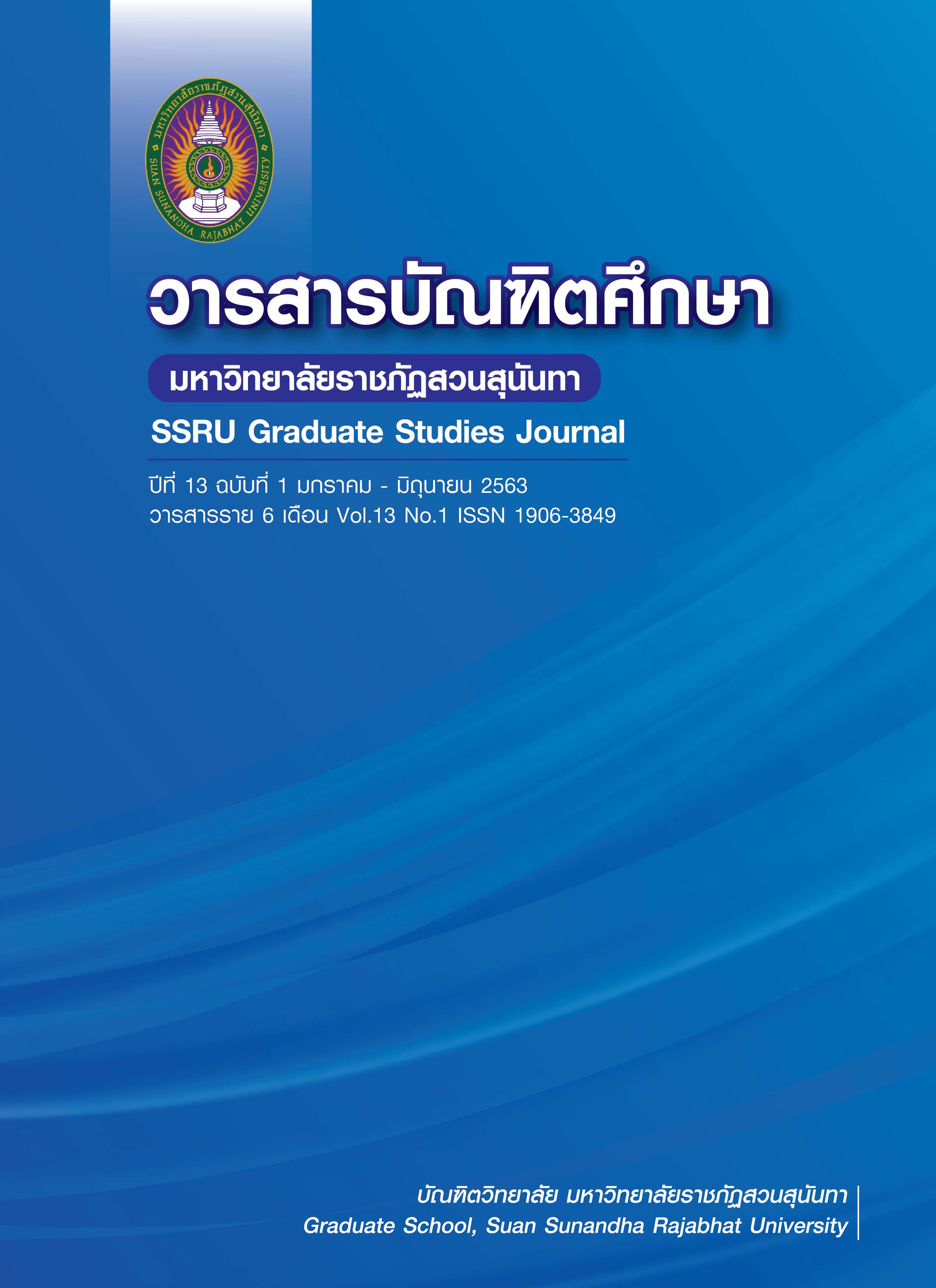Managerial Factors Affecting Competency Development of Teachers in The 21st Century in Primary Islamic Schools
Main Article Content
Abstract
The objectives of of this research were to study the level of managerial factors affecting competency development of teachers in the 21 century in primary Islamic schools, the competency level of these teachers, and managerial factors that affected the competency development of the teachers. The sample consisted of 314 respondents. Data were collected with the use of a questionnaire which had a reliability coefficient of 0.95. All 314 completed copies of questionnaire were returned. Data were analyzed with frequency, percentage, standard deviation and stepwise regression analysis.
The results showed that: 1) the managerial factors affecting competency development of teachers in the 21 century in primary Islamic schools were rated at a high level in overall, and when considering at each aspect, all aspects were also rated at a high level as well, especially personnel, structure and leadership. The aspect which had the least mean score was process; 2) the competency level of the teachers were rated at a high level in overall, and all aspects were also rated at a high level, especially student development which had the highest mean score; this aspect was followed by class management, relationship development and collaboration with a local community for the purpose of learning management, leadership, analysis and synthesis, respectively. The aspect that had the least mean score was research for student development; and 3) factors influencing competency development of the teachers included strategies (X5), process (X4), and personnel (X3).
Regression equation or predictive equation in raw scores = 1.996+.226X5+.188X4 + .122 X3
Regression equation in standard score y =.336Z5 + .250 Z4+ .188 Z3
Article Details
References
มหาบัณฑิต, มหาวิทยาลัยบูรพา.
ขวัญใจ สุดรัก. (2553). ปัจจัยการบริหารที่ส่งผลต่อประสิทธิผลการดำเนินงานตามมาตรฐานศูนย์พัฒนาเด็กเล็กขององค์การบริหารส่วนตำบลในจังหวัดปทุมธานี.
วิทยานิพนธ์ ศึกษาศาสตร์มหาบัณฑิต สาขาวิชาเทคโนโลยีการบริหารการศึกษา, มหาวิทยาลัยเทคโนโลยีราชมงคลธัญบุรี.
ฉัตรชัย หวังมีจงมี. (2560). สมรรถนะของครูไทยในศตวรรษที่ 21 : ปรับการเรียน เปลี่ยนสมรรถนะ. วารสารสถาบันเสริมศึกษาและทรัพยากรมนุษย์ มหาวิทยาลัย
ธรรมศาสตร์, 12(2)
ทรรศนกร สงครินทร์. (2560). ปัจจัยทางด้านการบริหารที่ส่งผลต่อประสิทธิผลของสถานศึกษาในสังกัดสำนักงานเขตพื้นที่การศึกษาประถมศึกษาภาคตะวันออกเฉียงเหนือ
ตอนบน. สาขาวิชาการบริหารการศึกษา คณะศึกษาศาสตร์, วิทยาลัยสันตพล.
เทื้อน ทองแก้ว. (2549). สมรรถนะ(competency) : หลักการและแนวปฏิบัติ.เอกสารประกอบการเรียนการสอนมหาวิทยาลัยราชภัฏสวนดุสิต.
บารีนา มะแซ. (2559). ปัจจัยด้านการบริหารที่ส่งผลต่อคุณภาพการศึกษาของโรงเรียนเอกชนสอนศาสนาอิสลามในสามจังหวัดชายแดนภาคใต้. สาขาบริหารการศึกษา
คณะศึกษาศาสตร์, มหาวิทยาลัยสงขลานครินทร์
บุญชม ศรีสะอาด. (2543). การวิจัยเบื้องต้น (พิมพ์ครั้งที่ 6). กรุงเทพฯ: สุวีริยาสาส์น.
ประภาพร จันทรรัศมี. (2554). กลยุทธ์การบริหารโรงเรียนเพื่อเสริมสร้างความแข็งแรงทางคุณธรรมจริยธรรมของนักเรียนประถมศึกษา. สาขาบริหารการศึกษา คณะ
ครุศาสตร์ จุฬาลงกรณ์มหาวิทยาลัย
ปัณฑารีย์ ฟองแพร่. (2559). ปัจจัยที่มีผลต่อการพัฒนาองค์กรให้มีศักยภาพการทำงานสูง:กรณีศึกษาธนาคารยูโอบี. หลักสูตรบริหารธุรกิจมหาบัณฑิต สาขาวิชาการ
จัดการธุรกิจโลก วิทยาลัยพาณิชยศาสตร์, มหาวิทยาลัยบูรพา.
ปิยนุช แสงนาค. (2559). สมรรถนะที่พึงประสงค์สำหรับครูในสถานศึกษาขั้นพื้นฐานสังกัดสำนักงานเขตพื้นที่การศึกษาประถมศึกษาจันทบุรี. สาขาการบริหารการศึกษา
บัณฑิตวิทยาลัย, มหาวิทยาลัยราชภัฏรำไพพรรณี
ไพฑูรณ์ สินลารัตน์. (2560). ครุศึกษาและการพัฒนาวิชาชีพครู. กรุงเทพฯ: จุฬาลงกรณ์มหาวิทยาลัย
ฟารีดา เชื้อผู้ดี. (2558). ความสัมพันธ์ระหว่างการบริหารตามหลักธรรมาภิบาลกับการบริหารตามหลักอิสลามของโรงเรียนเอกชนสอนศาสนาอิสลาม ในกรุงเทพมหานคร
และนนทบุรี. วิทยานิพนธ์ สาขาการบริหารการศึกษา, มหาวิทยาลัยราชภัฏธนบุรี.
ยุทธศักดิ์ ไชยสีหา. (2556). ปัจจัยทางการบริหารที่ส่งผลต่อการบริหารโดยใช้โรงเรียนเป็นฐานของโรงเรียนสังกัดเทศบาลนครขอนแก่น.ศึกษาศาสตรมหาบัณฑิต สาขา
วิชาการบริหารการศึกษา คณะศึกศาสตร์, มหาวิทยาลัยขอนแก่น
ราชบัณฑิตยสถาน. (2554). พจนานุกรมฉบับราชบัณฑิตยสถานพ.ศ.2554. เฉลิมพระเกียรติพระบาทสมเด็จพระเจ้าอยู่หัว เนื่องในโอกาสพระราชพิธีมหามงคลเฉลิม
พระชนมพรรษา 7 รอบ 5 ธันวาคม 2554. กรุงเทพมหานคร : ศิริวัฒนาอินเตอร์พริ้นท์.
สำนักงานเลขาธิการสภาการศึกษากระทรวงศึกษาธิการ. (2560). แผนการศึกษาแห่งชาติ พ.ศ.2560-2579. กรุงเทพฯ: สำนักงานเลขาธิการสภาการศึกษา
สำนักงานคณะกรรมการกฤษฎีกา. (2547). พระราชบัญญัติระเบียบข้าราชการครูและบุคลากรทางการศึกษาพุทธศักราช 2547. กรุงเทพฯ : สำนักงานคณะกรรมการ
กฤษฎีกา
สำนักงานคณะกรรมการข้าราชการพลเรือน(สํานักงานก.พ.). (2553). คู่มือกำหนดความรู้ ความสามารถ ทักษะและสมรรถนะสำหรับตำแหน่ง (พิมพ์ครั้งที่ 1).กรุงเทพฯ:
ประชุมช่าง.สำนักพัฒนาครูและบุคลากรทางการศึกษาขั้นพื้นฐาน สำนักงานคณะกรรมการการศึกษาขั้นพื้นฐาน. (2553).
อรพรรณ ทิมครองธรรม.(2560, มกราคม-มิถุนายน).ปัจจัยที่ส่งผลต่อการจัดการเรียนรู้ในศตวรรษที่ 21 ของรูสหวิทยาเขตเบญจบูรพา สังกัดสำนักงานเขตพื้นที่การศึกษา
มัธยมศึกษา เขต 2. บัณฑิตวิทยาลัย มหาวิทยาลัยรามคำแหง
อัครเดช ไม้จันทน์. (2560). ปัจจัยที่มีผลต่อประสิทธิภาพในการปฏิบัติงานของพนักงานกลุ่มอุตสาหกรรมติดตั้งเครื่องจักรสายการผลิตในจังหวัดสงขลา. วิทยานิพนธ์
บริหารธุรกิจมหาบัณฑิตมหาวิทยาลัยสงขลานครินทร์.
Adams, D., Raman Kutty, G. & Mohd Zabidi, Z. (2017). Educational Leadership for the 21st Century. International Online Journal of Educational
Leadership, 1(1), 1-4.
Benade, L., & Gardner, M., Teschers, C., & Gibbons, A. (2014). 21st Century Learning in NewZealand: Leadership Insights and Perspectives.
Journal of Educational Leadership, Policy and Practice. 29. 47-60.
Hafsah Jan. (2017). Teacher of 21 st Century: Characteristics and Development. School of Education & Beharioural Sciences, University of
Kashmir, Srinagar India
Jan, H. (2017). Teacher of 21 st Century: Characteristics and Development. School of Education & Beharioural Sciences, University of Kashmir,
Srinagar India.
Kingsley O. Omorogiuwa, evelyn O. aibangbee. (2017). Factors Influencing The effectiveness of school based assessment in public junior
secondary schools in Benin city (Nigeria).
McClelland, D.C. (1973). “Testing for Competence Rather than for Intelligence.” American Psychologist 28, 1(January): 1-14.
Nessipbayeva, O. (2010).The Competencies of the Modern Teacher. Suleyman Demirel University Almaty Kazaksatan.
Singh, R. & Muniandi. (2012). Factors Affecting School Administrators’ Choices in Adopting ICT Tools in Schools - The Case of Malaysian
Schools.
Voogt, J. (2011). Teacher competencies for 21st century pedagogy. University of Twente, Netherlands.
Yamane, Taro. (1973). Statistics: An Introductory Analysis. Third editio. Newyork :Harper and Row Publication.


